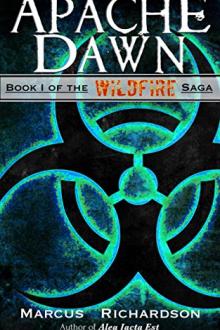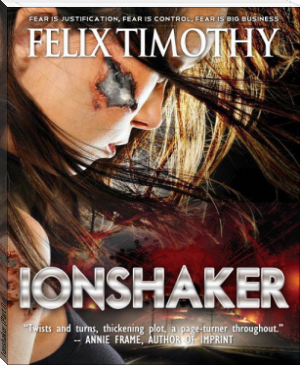Apache Dawn - - (classic fiction .TXT) 📗

- Author: -
- Performer: -
Book online «Apache Dawn - - (classic fiction .TXT) 📗». Author -
Washington, D.C.
U.S. Naval Observatory
Vice Presidential Emergency Operations Center
The Vice President pushed past his Secret Service bodyguard and slammed the door to his private suite in the bunker. Alone at last. He looked toward the ceiling of the oak-paneled briefing room. Above him, there was a hundred or more feet of earth and a veritable labyrinth of rooms and tunnels. He may not occupy the White House yet, but the Vice President’s nuclear bunker was pretty close to anything the White House offered.
He strolled into the expansive kitchen area and tore open the large stainless steel fridge to find it fully stocked with his favorite beer and wine. He grabbed a cold Stella Artois and savored the first cold, crisp taste. In two swallows, he had downed half the bottle.
It had been a hell of a day.
Out of habit, he stalked over to the far wall in the living area, expecting to rip the curtains back and see a window. He’d spent so many nights in hotel rooms across the country and around the world in the last four years, he almost felt more at home gazing through a window overlooking a foreign city than staring at his own backyard in Ohio. Yet, when he flung the curtains open, he saw only a large black screen embedded flush in the wall.
He sighed and took another swallow of the cold beer. He chuckled, looking at the fancy European label and remembered how the Prime Minister of England had laughed when he had seen the Vice President’s beer of choice.
“Surely you jest, old boy,” the stodgy Brit had said over the rims of his Ben Franklin glasses.
“Nope. Love it,” he’d told the British leader, while smiling at another dignitary across the room.
After he stopped laughing, the PM gave the visiting VP the hairy eyeball. “You do realize, of course, that particular beverage you are enjoying so earnestly right now is considered the…ah…wife beater of beers?” He’d burst out laughing again, a deep, throaty guffaw.
Barron had grinned and saluted the PM with his gold-rimmed pint glass. “Cheers, mate!”
Returning to reality, the Vice President belched and turned on the large TV screen, immediately seeing the classified reports privy only to the upper echelon of the U.S. Government. One channel had an up-to-date map of reported cases of the mysterious H5N1-variant strain across the country. He could clearly see the angry red welts on the map in California, up the West Coast and into Canada. Vancouver looked like one big red blob—they were taking it on the chin pretty hard up there.
New York appeared like a red cancer. A chain of dots stretched to Boston in the north and Philly in the south. Washington was surrounded by a small army of red dots. The cases thinned out the farther south on the map his eyes traveled, but he swore there were a hell of a lot more dots on the screen—representing 100 cases as marked on the map legend—than there were just two hours earlier.
Guilt washed over him. He knew. He alone in the whole country knew the truth of where and how this massive epidemic had started. It was his fault. The deaths of all those Americans rested on his shoulders, threatening to crush him with remorse.
He, Harold J. Barron, Vice President of the United States, had authorized the release of the North Korean-made bio-weapon based on an especially deadly strain of flu last seen during The Great Pandemic. He had committed High Treason. When he had given his soul to Jayne and Reginald, he had given them certain codes to gain access to American security grids, protocols, and agencies.
Days. It had only taken days for Reginald’s employers to wreak havoc on the country. Reginald was one very well-connected man. A sickening thought occurred to him: how long had Reginald’s employers plotted and waited for the right moment to strike? Months? Years? How many political victories had he racked up because of the unseen hand of Reginald’s employers? How long had they owned him?
The Vice President hadn’t given the actual command to launch the attack, and of course he had taken no physical part in it, but he had allowed it. He had enabled it. Guilt crashed against his psyche again and again, like waves that pummeled a crumbling shoreline. He stared at the red dots on the map. All those Americans were sick because of him. So many would die because of him. So many had died, because of the frailties of his flesh.
Jayne. All of this, the nuclear strike, the weaponized-flu—it had all started in that hotel room with Jayne.
Jayne had forced him to receive what she called “the only known” vaccine last week, so he wasn’t worried for himself, or even his family. He’d made sure his family had secretly received the vaccine as well. He stared at the dots and finished the rest of the bottle. He purposely avoided looking at the angry black and red bullseye over Atlanta.
“Jesus…God, forgive me,” he muttered, tears welling up in his eyes again. Anger fought with guilt to control his emotional rollercoaster. He threw the beer bottle toward the wall in frustration. It exploded on impact and showered the carpet with glass.
James Conway, his permanently assigned Secret Service agent, threw open the door and scared the Vice President half to death. He thought he’d locked the damn door.
“I’m fine!” he called as the agent stormed the room, pistol in hand. “I just…” The Vice President looked at the broken glass on the floor by the far wall and shrugged. “It’s been a rough day…”
James relaxed with a barely perceptible dip of his shoulders. The gun vanished inside his coat in a well-practiced flash of movement. He nodded and took one more look around the room.
After he shut the door behind him, the Vice President turned to face the screen again and loosened his tie angrily. He ripped his jacket off and threw it on the floor in impotent rage. Reginald was behind this, he was sure of it.
“You never said anything about nuking an American city,” he hissed under his breath, glaring at the bullseye over Atlanta. The casualty figures on the right side of the map continued to rise. The last official count was 326,987 killed, and another 273,432 missing and suspected dead.
He reached out a finger and touched the angry bullseye. The screen flickered and was split into four quadrants. The upper-left screen showed a live feed from Atlanta, just outside the radiation zone on the south side. Crumpled buildings, illuminated by the countless fires that burned, uncontrolled, in the deepening night, reached up from the ground like the charred fingers of a corpse. It was a ghoulish nightmare scene.
The upper-right screen showed a replay loop of the footage the NSA had obtained from a man filming clouds the instant the bomb went off. The Vice President had seen it over and over again already, but could not stop watching.
The camera zoomed in on one of the dark-bellied cumulous clouds, then the screen went white. Slowly, the image faded back into view but it shook violently. The camera swung all over place, from the grass to the trees, as the man ran up a slight hill to see where the flash had come from. The Vice President noticed that everything had a white-pink tint to it, an after-effect he had been told, of the nuclear blast on the camera’s imaging sensor.
At the crest of the hill, the camera panned around shakily before settling on the skyline of Atlanta, a few miles to the north. There it was. Growing upwards on a twisted, writhing column of smoke not unlike some demonic bean plant, a mushroom cloud was rising and expanding, glowing a sullen orange from the inside.
It was the most unsettling, obscenely beautiful yet haunting thing he had ever seen in his entire life. The image trembled as the shockwave blasted its way through Atlanta in the distance. He could actually see skyscrapers as they collapsed into a cloud of debris billowing in the wake of the nuclear inferno. The image froze. It was the last thing the cameraman recorded—he turned and ran for his life at that point.
The Vice President ran a hand through his dark hair and sighed as he looked at the lower-left side of the screen, showing a detailed aerial map of Atlanta. Damage estimates and fatalities were highlighted in garish shades of red and orange.
Two-thirds of the city was just flattened rubble now, glowing with atomic heat that would take decades to dissipate. The damage, he noticed, seemed to be worse in the northeast corner of the downtown district.
“Fuck me,” he whispered in disbelief. Right there, before his eyes, there was an actual crater on the image from a passing satellite. Someone had used a damn big nuke.
On the lower-right screen, he saw a home movie from another part of the country, almost as scary as the one from Atlanta. The scene was a peaceful beach on the Atlantic coast of Florida, just north of Daytona. Someone was filming their kids playing in the surf. Then off in the distance, a splash of white on the horizon heralded something unusual had





Comments (0)